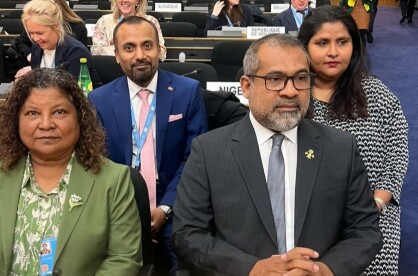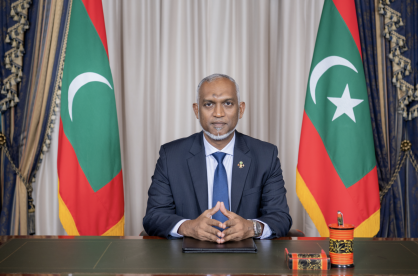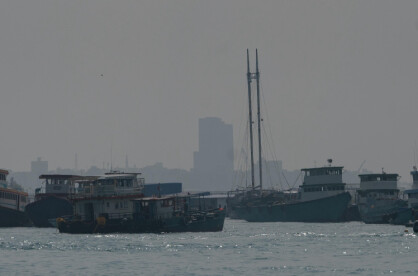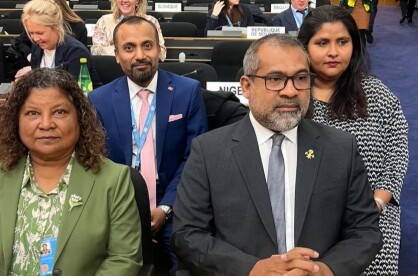Public Sector Investment Program 2022
A glance at the government's PSIP projects for 2022; valued at MVR6.2 billion, of which MVR2.6 billion is expected to be funded from domestic sources.

A glance at the government's PSIP projects for 2022; valued at MVR6.2 billion, of which MVR2.6 billion is expected to be funded from domestic sources.

The Public Sector Investment Program (PSIP) is the main tool through which the government sets out to achieve economic development objectives and deliver on the pledges it has made to the people. Minister of Finance Ibrahim Ameer, in his presentation of the budget estimated for 2022 to parliament for approval, said that one of the objectives of the budget is to ensure strong growth for the year, while maintaining fiscal and debt sustainability, keeping in mind the challenges and risks the country faces, especially with the impact from the COVID-19 pandemic.
The government has estimated that PSIP projects valued at MVR6.2 billion will be implemented in 2022, with MVR2.6 billion funded from domestic sources, MVR2.7 billion financed through foreign loans, MVR548.9 million through grants, and MVR414.5 million from trust funds.
Table 1: Public Sector Investment Program (PSIP), 2022

The Ministry estimates that 27.9 percent of total PSIP expenditure will be on the development of harbours and transport, 15.2 percent on the development of water and sanitation systems and 14.9 percent on environment protection. Reclamation and roads, and housing follows next at 9.8 percent and 9.6 percent respectively. The following chart shows the percentage of expenditure from PSIP on specific sectors.
Chart 1: PSIP allocations for specific sectors, 2022

Table 1: PSIP allocations for Harbours and transportation projects, 2022

One of the major components of the PSIP under harbours and transport is the Greater Malé Connectivity Bridge, linking Malé, Vilingili, Thilafushi and Gulhifalhu, for which MVR543.3 million is estimated will be disbursed in 2022, from a loan availed from Indian EXIM Bank, and MVR76.2 million in grant funds from the Government of India.
The other major component of airports (estimated total of MVR 663.3 million) includes disbursements from loans availed from various parties, including the Saudi Fund, the Abu Dhabi Fund and the Kuwait Fund, for the development of the terminal at the Velana International Airport, and a loan from the Indian EXIM Bank for the upgrading of the HDh. Hanimaadhoo Airport, both of which are ongoing, and a loan from the India EXIM Bank for upgrading the S. Gan Airport, which was marked to be in the pre-tendering stage at the time of budget submission.
The construction of harbours, estimated at MVR425.3 million, financed entirely from the domestic budget, includes the development of new harbour as well as ongoing projects and the retention funds for completed projects.
As indicated by the numbers, a large proportion of the expenditure on harbours and transport is concentrated in the Greater Malé Area, with the spending on the Greater Malé Connectivity Bridge and the Velana International Airport development, both of which also account for close to 20 percent of total PSIP expenditure.
Table 2: PSIP allocations for water and sanitation projects, 2022

One of the key pledges of the Solih administration is to ensure that all inhabited islands have adequate water and sanitation systems established, and the PSIP allocations for 2022 reflect a commitment to fulfil this promise. Water and sanitation projects have MVR954.4 million or 15.2 percent allocated to them. The allocations include an Indian EXIM bank funded ongoing project in 34 islands, an OFID funded project, an Islamic Development Bank (IDB) funded project in five islands, as well as MVR209 million from the domestic budget for water and sanitation systems. The government on 29 December had signed contracts for water and sanitation projects for the 23 islands that currently do not have the mechanisms in place.
Table 2: PSIP allocations for environment protection, 2022

The majority of funding for projects classified under environment protection come from loans, grants and trust funds, with MVR888.8 million of the total MVR932.4 million estimated for this sector coming from these sources. The main projects in this category include a project on preparing the outer islands for sustainable energy development, funded by the European Investment Bank (EIB) and the Asian Development Bank (ADB) implemented across various islands, an environmental improvement and waste management project in the Greater Malé Area, implemented in K. Thilafushi, funded by the Asian Infrastructure Investment Bank (AIIB), ADB and the IDB. The Greater Malé Waste to Energy project, funded under a MVR112.2 million initial grant from the ADB, is scheduled to commence in 2022, part of the government's commitment to resolve the Thilafushi waste management issue. The project will seek to establish a sustainable solid waste management system for the Greater Malé Area through developing treatment, recycling, and disposal infrastructure.
An allocation of MVR617.2 million is estimated for 2022 for land reclamation and road projects, which amounts to 9.8 percent of total PSIP. Reclamation projects include Gulhifalhu reclamation under a loan funded by the ING Bank, for which the MVR15 million estimated will be disbursed in 2022. It also includes land reclamation for the Addu City Development Project, funded under a loan financed by the Indian EXIM Bank, under which the MVR109.2 million estimated will be disbursed during the year. The EXIM bank is also funding the road development component of the Addu Project.
Housing, one of the government's main pledges, and an issue which has always been subject to controversy, is allocated MVR599.7 million in 2022, with majority funding to come from domestic sources. The projects under this component include MVR3.6 million for a 1,500 housing unit project across various islands, 100 units in H.Dh. Nolhivaranfaru, 105 units in HDh. Khulhudhuffushi, 100 units in B. Thulhaadhoo, 100 units in Lh. Naifaru, 100 units in M. Kolhufushi, 100 units in Th. Vilufushi, 100 units in Th. Thimarafushi, 60 units in HDh. Nilhivaranfaru, 100 units in HDh. Hanimaadhoo, and five units in HA. Dhidhoo. These projects are in various stages, with retention budgeted for some, while others are ongoing, at pre-tendering stage, or new projects to start in 2022.
The PSIP allocations for 2022 certainly attempt a mad dash at fulfilling the government's infrastructure development pledges, from ensuring water and sanitation systems are established across the country, to a stab at housing projects, as well as the development of harbours, road and ferry networks across the country.
What is patently disappointing to see however is that the country has yet again failed to learn from the vulnerable position it was in during the recent pandemic. Not enough focus has been given to economic diversification through investments in fisheries and agriculture beyond the establishment of ice plants across the country, or any other industries for that matter. One wonders perhaps it is time to take the focus of the PSIP away from infrastructure development into real investments that contribute to national growth and ones that provide a return.



